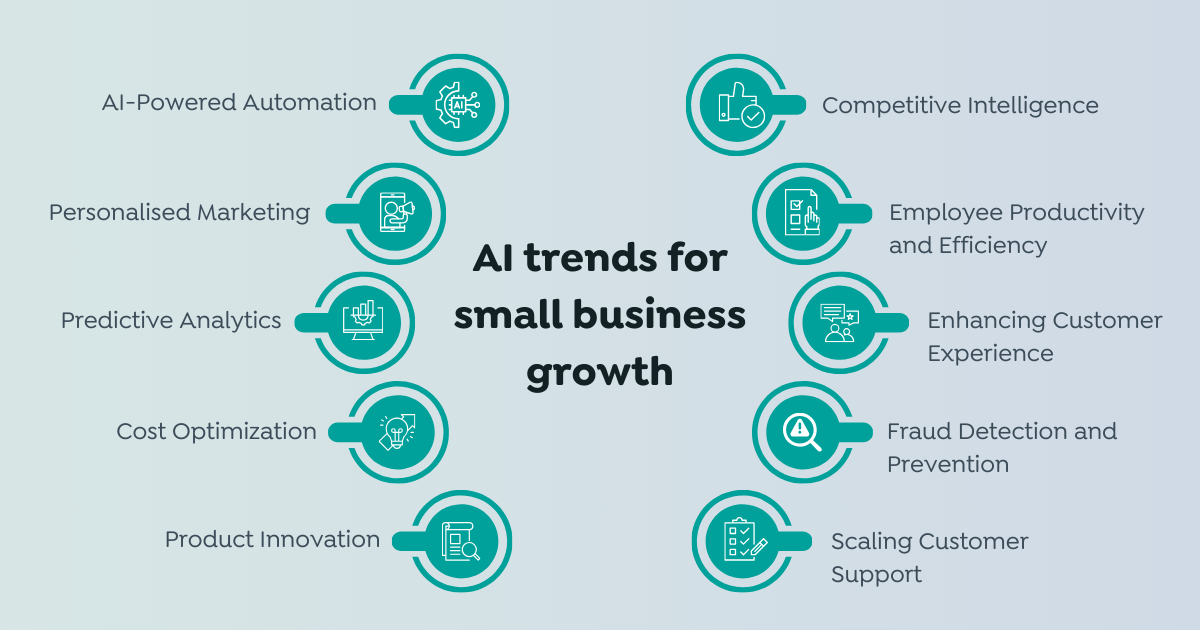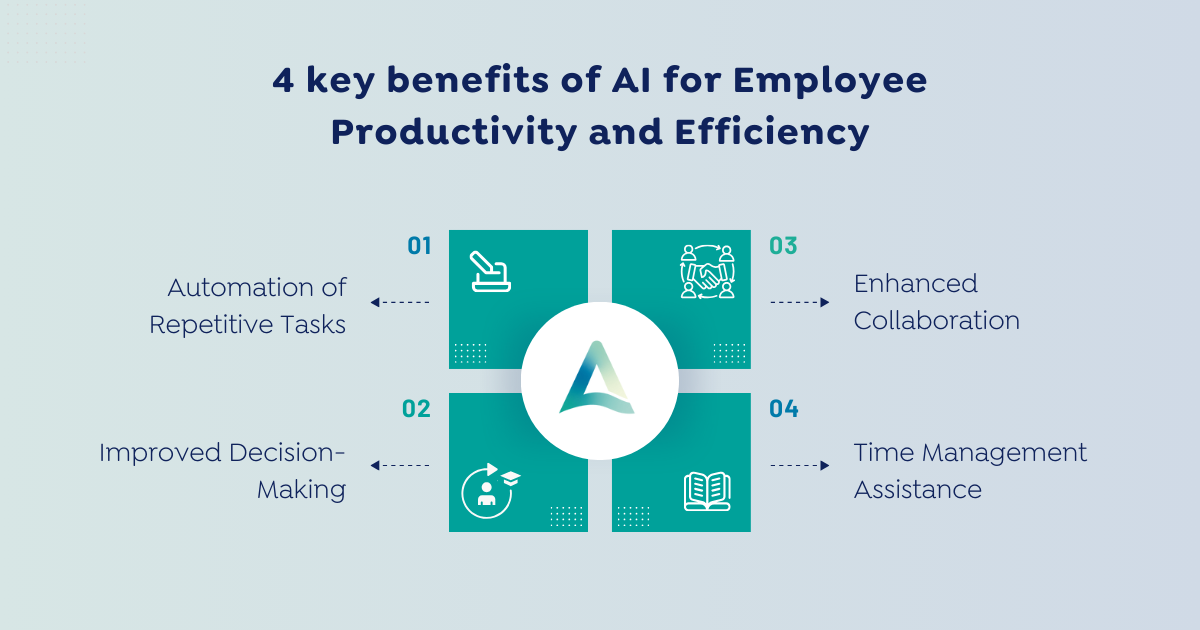AI trends – how AI can help small businesses

Imagine running a business where repetitive tasks are automated, customer insights are available at your fingertips, and decisions are backed by predictive analytics. AI is no longer a tool for large corporations; AI is transforming decision-making in business across the UK to streamline operations, boost efficiency, and scale faster than ever.
According to a PwC report, AI has the potential to contribute up to £232 billion to the UK economy by 2030. AI isn’t just a tech trend for small businesses—it’s a competitive necessity. From reducing costs to improving customer experience, AI can level the playing field, allowing small businesses to compete with industry giants.
If you’re new to AI, read our blog What is AI, How Does It Work, and What Can It Be Used For? for a comprehensive introduction.
1. AI-powered automation: saving time and money
One of the biggest challenges for small businesses is managing time and resources effectively. AI-powered automation helps eliminate repetitive tasks, enabling business owners to focus on growth and innovation. According to McKinsey, 60% of occupations could see 30% of their activities automated, even in small businesses.
Real-world Applications:
- Accounting: Tools like Xero and QuickBooks automate bookkeeping, invoicing, and tax calculations, reducing manual errors and saving hours each week. For instance, a Bristol-based café owner reduced their bookkeeping time by 40% using Xero.
- Inventory management: AI systems predict stock requirements, reducing overstocking and wastage. A food delivery service in Manchester implemented an AI-powered system to manage inventory, cutting costs by 25%.
- Customer service: Chatbots like Zendesk AI handle customer queries 24/7. A UK-based e-commerce business reported a 35% improvement in customer satisfaction after deploying an AI chatbot to address FAQs and complaints.
For insights into how automation is driving change in e-commerce, explore our blog AI for E-Commerce: How It’s Transforming the Future
2. Personalised marketing: engaging your audience
AI’s ability to analyse data and predict customer behaviour has transformed marketing strategies. By delivering personalised content, businesses can engage customers effectively, boosting loyalty and conversion rates.
Real-world Applications:
- Email marketing: AI tools like Mailchimp segment customers based on behaviour, sending tailored emails that drive engagement. For example, a London bakery used AI to send birthday discounts, resulting in a 20% boost in repeat purchases.
- Ad targeting: Platforms like Google Ads leverage AI to adjust bids and optimise targeting in real-time. A wellness brand in Birmingham saw a 30% increase in ROI after adopting AI-driven ad campaigns.
- Social media management: AI tools like Buffer recommend posting schedules, analyse engagement, and suggest content. A boutique in Manchester grew its Instagram following by 25% within three months using AI insights.
3. Improving decision-making with predictive analytics
Small businesses often rely on intuition when making key decisions. AI changes this by providing data-backed insights that reduce risks and increase profitability.
Real-world Applications:
- Sales forecasting: AI-powered tools like HubSpot analyse past sales trends to forecast future performance. A Glasgow-based retailer used predictive analytics to anticipate seasonal demand, increasing sales by 15% during peak periods.
- Market research: Tools like SEMrush help businesses identify competitors’ strategies and market gaps. A Leeds-based graphic design agency expanded into a new niche after using SEMrush, growing revenue by 20%.
For more insights into AI’s role in smarter decision-making, read How AI is Transforming Decision-Making in Business
4. Enhancing customer experience with AI
Delivering an exceptional customer experience is critical for retention. AI enables small businesses to provide faster, more personalised service at scale.
Real-World Applications:
- AI-powered chatbots: Chatbots like Intercom provide instant, round-the-clock support. A UK electronics retailer reduced response times by 50%, leading to higher customer retention.
- Recommendation systems: AI-driven engines suggest products based on user behaviour. A Manchester-based online clothing store reported a 30% rise in repeat purchases after implementing AI recommendations.
- Sentiment analysis: AI tools like Lexalytics analyse reviews and social media mentions, helping businesses improve their offerings. A salon in Edinburgh increased positive reviews by 15% after addressing customer concerns highlighted by AI insights.
5. AI for competitive intelligence
AI can help small businesses monitor competitors’ strategies, identify market gaps, and adjust their offerings to stay ahead. By leveraging AI tools, businesses can track competitor activities, analyse customer sentiment, and uncover emerging trends. This enables small businesses to make data-driven decisions, refine their strategies, and respond quickly to market shifts, giving them a competitive edge.
Real-World Applications:
- Market analysis: AI tools like SEMrush and Crayon allow businesses to track competitors’ digital marketing efforts, identifying trends and gaps in the market. For instance, a retail business in London used AI-powered market analysis tools to spot emerging product trends, leading to a 15% growth in their product line’s sales.
- Social media monitoring: AI tools like Brandwatch or Hootsuite Insights can analyse competitors’ social media presence and audience engagement, helping businesses fine-tune their strategies. A fitness brand in Manchester optimised its social media campaigns by analysing competitors’ engagement metrics through AI tools, leading to a 20% increase in social media conversions.
- Product positioning: AI-driven tools like SimilarWeb allow businesses to assess competitors’ digital traffic sources and adjust their product positioning accordingly. A Birmingham SaaS company used SimilarWeb insights to refine its offerings, resulting in a 10% increase in customer sign-ups.
- Pricing strategy optimisation: AI tools like PriceIntelligence help businesses analyse competitors’ pricing strategies, enabling them to adjust their pricing in real-time. A boutique in Brighton leveraged AI to track competitors’ pricing changes and optimised its prices, boosting sales by 12% in just two months.
6. AI for employee productivity and efficiency
AI can also be used to boost employee productivity by automating administrative tasks, enhancing collaboration, and providing insights to improve workflow. This allows employees to focus more on high-value work, driving business growth.
Real-World Applications:
- Task automation: AI-powered tools like Trello and Asana use AI to automate project management tasks, ensuring that teams stay on track and deadlines are met. A UK-based design firm reported a 30% improvement in team productivity by using AI-powered scheduling tools.
- Collaboration enhancement: AI-driven collaboration platforms like Slack integrate with various tools, providing automated notifications and suggestions that improve team communication. A remote consulting firm in London used Slack AI integrations to increase communication efficiency, reducing project timelines by 20%.
7. AI for cost optimisation
AI can help small businesses optimise costs by identifying inefficiencies, automating processes, and recommending smarter resource allocation. By reducing waste and improving efficiency, AI plays a significant role in maximising profit margins.
Real-World Applications:
- Expense tracking and optimisation: Tools like Expensify use AI to automate expense reporting, eliminating human errors and ensuring compliance. A small business in Manchester cut its administrative costs by 25% after implementing an AI-powered expense management system.
- Energy management: AI-powered energy management tools help businesses monitor usage patterns and optimise consumption. A restaurant chain in Liverpool used AI to reduce energy consumption, saving up to 15% on monthly utility costs.
- Supply chain cost reduction: AI tools like Llamasoft help businesses optimise supply chain management by predicting demand, reducing overstocking, and improving delivery efficiency. A UK-based logistics company saved 20% in transportation costs by implementing AI-driven supply chain optimisation.
8. AI in fraud detection and prevention
AI is becoming a key player in enhancing fraud detection and prevention for small businesses. With real-time data analysis, AI can identify unusual patterns or behaviours that might indicate fraudulent activity, helping businesses take immediate action to protect themselves.
Real-World Applications:
- Transaction monitoring: AI-powered fraud detection tools like Kount can analyse transactions in real-time and flag suspicious activities. A UK-based online retailer saw a 40% reduction in fraudulent transactions by implementing AI fraud detection systems.
- Credit risk analysis: AI tools assess customer creditworthiness more accurately by analysing historical data and patterns. A financial services company in Edinburgh reduced loan defaults by 18% by using AI for credit risk assessment.
- Insurance fraud detection: AI can also be used to identify fraudulent insurance claims by analysing data such as claim history, customer profiles, and transaction patterns. A UK-based insurance company reduced fraudulent claims by 25% after implementing AI to detect inconsistencies in claims data.
9. AI-driven product innovation
AI enables small businesses to innovate faster by providing insights into customer needs, market trends, and product performance. This allows businesses to develop new offerings or improve existing ones, ensuring they remain competitive in a rapidly changing market.
Real-World Applications:
- Customer feedback analysis: AI tools like MonkeyLearn analyse customer feedback to uncover insights on product features and improvements. A software company in London used AI to identify key product improvement areas, leading to a 25% increase in customer satisfaction.
- Rapid prototyping: AI-powered platforms like Figma help businesses quickly prototype and test new product ideas, reducing the time between concept and launch. A tech startup in Bristol used AI-driven design tools to create and test prototypes in record time, leading to faster market entry.
10. AI for scaling customer support
AI helps businesses scale their customer support operations without adding extra headcount. With tools like chatbots and automated ticketing systems, businesses can provide 24/7 support to customers while keeping costs low.
Real-World Applications:
- Chatbots and virtual assistants: AI-powered chatbots like Drift provide instant responses to customer queries. A UK-based tech company boosted its customer support efficiency by 50% after integrating an AI-powered chatbot that handled basic queries, freeing up agents for complex issues.
- Automated ticketing systems: AI tools like Freshdesk automate ticket routing and prioritisation, ensuring that customers’ issues are addressed quickly. A service provider in Manchester reduced response times by 30% after adopting an AI-driven ticketing system.
- Sentiment analysis for customer feedback: A UK-based e-commerce company used AI-driven sentiment analysis tools to analyse customer reviews and live chat conversations. The AI flagged negative sentiments in real-time, allowing customer support agents to resolve issues before they escalated, leading to a 25% increase in positive customer feedback and higher retention rates.
Conclusion
AI is no longer a luxury reserved for large corporations—it’s a powerful tool that small businesses can use to streamline operations, improve customer experiences, and stay competitive. By automating repetitive tasks, providing deep customer insights, and enabling smarter decision-making, AI levels the playing field for entrepreneurs, allowing them to focus on innovation and growth.
As AI continues to evolve, the opportunities for small businesses to harness its potential will only increase. From boosting productivity to enhancing customer engagement, adopting AI can drive efficiency and open up new avenues for growth. Small business owners who embrace AI today are positioning themselves for success tomorrow, helping them stay agile, reduce costs, and scale faster than ever before.
Don’t wait for the future—start integrating AI into your business strategy today, and unlock the tools to propel your business forward.
What our clients say














